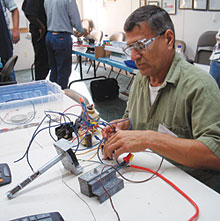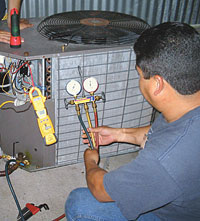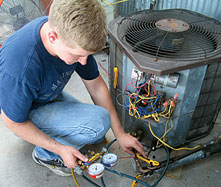
The HTC curriculum was custom developed by the 61-year-old Potter, and it is based on his 44 years of HVAC field work experience. Students complete a three-month course consisting of 192 hours of hands-on service and classroom training. The Hockley, Texas-based school is fully approved by the state licensing agency, Texas Workforce Commission.
HVAC service companies that receive some of the 120 graduates per year overlook the unconventionality of the school and rely on Potter's training skills and dedication.
"We've gotten 15 service techs from the HTC," said Andrea Marquez, vice president at mid-sized mechanical contractor Dependable Comfort Air Conditioning & Heat, Houston, "and they always perform well when we spring one of our famous pop quizzes or impromptu on-site evaluations after they've finished a service call."
Replacement vs. Repair
The school covers the HVAC basics of electricity, refrigeration cycles, superheat, subcooling, performance testing with both wet bulb and dry bulb methods, airflow, duct sizing, and commercial refrigeration. Students are expected to master 35 common service tasks that they can practice with an array of working equipment Potter has collected over the years and combined into a hands-on training shop.But while trade schools are expected to cover the basics, Potter teaches three principles that he feels are missing from many curriculums - "Honesty, Integrity, and Professionalism" (HIP), which is also the school's motto.
"It's very important to our management that service techs provide our customers with an accurate assessment of service work," said Marquez. "Sure, we'll recommend replacing a 25-year-old piece of equipment, but we want to be very sure the customer has honest facts so they can make their own decision."

Stresses Leak Detection
Refrigerant leak detection is yet another unconventional curricula subject separating Potter from other teachers. Many service techs skip leak detection because finding the applied dyes that have leaked out of the system typically requires a second trip to the site at dusk or at night when most ultraviolet (UV) lights are visible.Because of his penchant for cutting-edge technology, Potter introduces students to the Vector 7 by Cliplight Manufacturing, Toronto. This is a powerful light designed to highlight dyes even in bright sunlight.
Since Potter's credo is repair versus replace, another Cliplight product, a refrigeration sealant for residential and commercial refrigeration and air conditioning systems called Super Seal HVACRâ„¢, offers students the possibility of sealing a system when a leak is undetectable or inaccessible for repair. Potter estimates about 80 percent of leaks are in condenser or evaporator coils, so a sealant that stops leaks but doesn't affect compressors, expansion valves, or driers is invaluable.
"If I had technology like that 10 years ago, air conditioning service would have been a lot easier," said Potter.
Tony Marquez, who founded Dependable, attended a large trade school that never covered leak detection, but he said he's thankful Potter graduates have hands-on experiences on this important topic. Introducing students to new cutting-edge products makes them better prepared for future industry concerns, according to Potter. With heat recovery and mold reduction important to the developing industry trends of energy efficiency and indoor air quality (IAQ), respectively, Potter instructs students on servicing accessories and suggesting them to customers. He uses heat recovery ventilators by Carrier, Lennox, and Rheem Manufacturing, in energy recovery discussions; and Carrier, Lenox, and Trane, for ultraviolet light air purification classes on IAQ.

Prior to founding the HTC, Potter worked for Hallmark Air Conditioning, Houston, for 10 years as a technician and a technical director. The other 34 years of air conditioning and refrigeration trade work has included owning his own service company, military air conditioning service in Vietnam, and transport refrigeration system repair, to name just a few.
What impresses service companies is that Potter offers students up to one year of free after-graduation telephone support on tough field problems. Dana Jones, who graduated last year and founded the HVAC service company, Integrity Comfort Professionals, Houston, has tapped Potter's experience for several difficult field problems.
One instance of a 5-ton residential air conditioner that displayed high-pressure problems and poor cooling stumped even the manufacturer's technical support representatives. Jones had recovered the refrigerant, replaced the expansion valve, driers, triple-checked for line obstacles, among other textbook troubleshooting methods he learned at HTC, to no avail.
Potter discussed the problem over the phone and suspected noncondensables had probably resided in the system before refrigerant recovery and flared up when the frugal customer requested reinstating the refrigerant to save money.
"I learned all the fundamentals at HTC," said Jones, "but there's no substitute for 44 years of experience."
Another reason for Potter's success at communicating with students one-third his age is the use of easily understood analogies. For example, he'll use the analogy of a sponge and its ability to soak up water and release it when squeezed. In a refrigeration cycle, the refrigerant acts as a sponge as it absorbs heat that is later squeezed out by the compressor.
"I like the analogies, but I also liked that he didn't use the real name of principles like superheat, psychrometrics, and thermal dynamics until everybody understood it," quipped Jones.
"Instead of announcing the study of psychrometrics and scaring everyone to death, he'll tell the class they're going to study the properties of air."
Many Texas contractors feel HTC is filling a need in the state service industry that is currently suffering a shortage of service technicians.
"The main topic of discussion at local association meetings is how many entry-level people are poorly trained and that there's a shortage," said Jones. "HTC is helping solve both of these problems."
John Parris Frantz is a freelance writer. He can be reached at John@jpfcomm.com.
Publication date: 08/01/2005

Report Abusive Comment